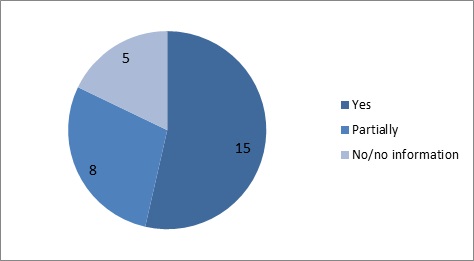Are there mandatory accessibility standards for national and local authority buildings?
Accessibility to the physical environment, including buildings, is required by Article 9 of the CRPD. Article 9 (2) (a) highlights that one important way of making the physical environment accessible is to “develop, promulgate, and monitor the implementation of minimum standards and guidelines for the accessibility of facilities and services open or provided to the public.” In addition, ensuring accessibility of the built environment is a key feature of the commitments made in the European Disability Strategy (2010-2020).
Providing accessibility to public buildings, such as polling stations and local and national government buildings, is vital to ensure that persons with disabilities can exercise the right to vote and fully participate in public discussions on political issues. Physical accessibility measures have relevance for all persons with disabilities, not only those with physical impairments. They include installing ramps, lifts, wheelchair-accessible bathrooms and providing information in braille.
This indicator assesses whether mandatory accessibility standards for the construction or significant alteration of public authority buildings are in place in the EU Member States. It is based on data collected as a part of a study funded by the European Commission under standardisation mandate 420 and published in 2011. The study gathered information through questionnaires sent to national experts concerning existing legislation, standards and/or expert guidelines on accessibility requirements in the built environment in their country.
Are there mandatory accessibility standards in EU Member States for national and local authority buildings?

Source: FRA, 2014; Secretariat AENOR, 2011.
FRA’s analysis indicates that fifteen EU Member States, Austria, Belgium, the Czech Republic, Denmark, Finland, France, Hungary, Ireland, Italy, Lithuania, Luxembourg, Poland, Portugal, Spain and the United Kingdom have mandatory accessibility standards for the construction and alteration of national and local authority buildings. In most countries in this group, accessibility requirements are provided for in building regulations, which means that to be granted a permit to build or to alter existing buildings, accessibility standards must be met.
Even when standards are in place, there is an on-going challenge to ensure they are effectively and consistently enforced. In Spain, for example, accessibility criteria are the same for new and existing buildings. However, the law that protects historical buildings is reportedly often used to avoid making buildings accessible.
In the second group of Member States, Cyprus, Germany, Greece and Sweden, legislation allows for exceptions or only requires the partial application of accessibility standards when altering existing buildings. In Cyprus, steps to make existing buildings accessible must be ‘feasible’. Where accessibility is difficult to achieve, a committee adjudicates on the degree to which accessibility standards must be implemented.
No information was given in the report on accessibility standards in force for new and existing buildings in Slovenia, and there were no rapporteurs or national experts identified to provide information for Bulgaria, Estonia, Croatia and Latvia. The information provided for the Netherlands, Malta, Romania and Slovakia is insufficient to conclude whether accessibility standards apply both to new and existing buildings.